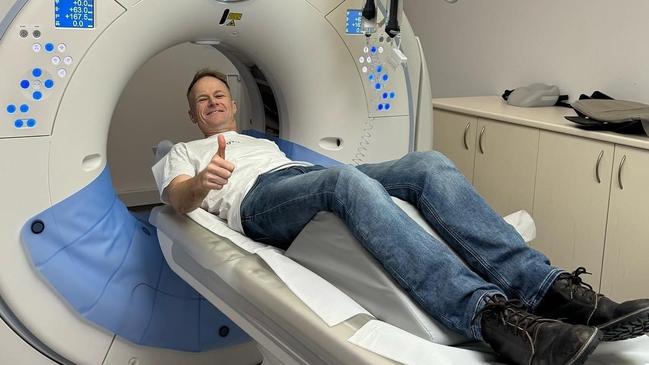Australians of the Year Dr Richard Scolyer and Georgina Long warn Territorians on high UV risk
For the 2024 Australians of the Year, an extraordinary and gruelling medical journey has not distracted them from the battle to end a ‘preventable’ disease – one being fuelled by social media.

News
Don't miss out on the headlines from News. Followed categories will be added to My News.
For all their work in treating melanoma, the 2024 Australians of the Year go back to the basics with their medical advice: “Prevention is better than a cure”.
Professors Richard Scolyer and Georgina Long said that a neglect of basic sun safety along with social media-fuelled tanning fads threaten to undo the success of the ubiquitous “slip, slop, slap, seek and slide” messaging.
The research partners arrived in the Territory on Monday as part of a national tour to educate Australians about the third-most common cancer, but one they believe is “completely preventable”.
They shared the Australia Day honours for running the Melanoma Institue in Sydney since 2017, but the recognition came amid a gruelling personal battle for Dr Scolyer.

The 57-year-old made international headlines last June when his incurable brain tumour was successfully treated with a combination of drug therapy, surgery and a personalised cancer vaccine – partly thanks to the research uncovered by his own institute.
“Being told you have an incurable cancer turns your life upside down,” Dr Scolyer said.
“All aspects of my life have changed, but I’ve felt fortunate to try these new therapies and giving it a crack to see if we can make a difference to others.
“You don’t really know when it’s going to come back. For most patients with the subtype I’ve got, the average time for recurrence is six months and now I’m past 12, so I feel like I’ve been lucky.
“But it doesn’t mean I’ve been cured, it just means I have to keep watching for any changes.”

Around 18,000 Australians were treated for invasive melanoma last year, and according to Dr Long, a diagnosis meant “certain death” just 25 years ago, when her experience as a medical student set a career course.
“It was dismal – I remember as a medical student meeting melanoma patients, and they were young, they were old, they were men, they were women, it didn’t discriminate,” she said.
“I thought it was an area that needed attention and as a medical oncologist, I saw an opportunity to try and make a difference.”
They said that the NT’s high UV levels meant that clothing up and wearing sunscreen were essential, as well as “knowing the skin you’re in” and monitoring changes.
The pair will remain in the Territory until Friday, stopping at primary schools and educating children about their work.
“The truth is we’re obviously contributors, but we have all these amazing people we work with and they’re the ones who have really allowed this opportunity to come about,” Dr Scolyer said.
In January, the federal government kickstarted a $7.3 million campaign with social media influencers to ‘End the Trend’ of suntanning, finding that one in three people aged 18-30 did not believe the practice was unhealthy.




